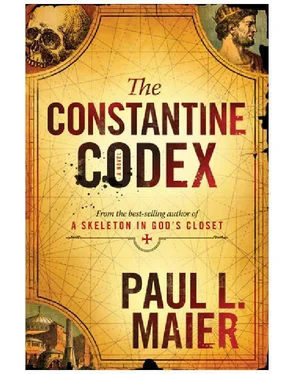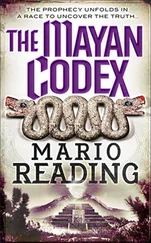Paul Maier - The Constantine Codex
Здесь есть возможность читать онлайн «Paul Maier - The Constantine Codex» весь текст электронной книги совершенно бесплатно (целиком полную версию без сокращений). В некоторых случаях можно слушать аудио, скачать через торрент в формате fb2 и присутствует краткое содержание. Жанр: Триллер, на английском языке. Описание произведения, (предисловие) а так же отзывы посетителей доступны на портале библиотеки ЛибКат.
- Название:The Constantine Codex
- Автор:
- Жанр:
- Год:неизвестен
- ISBN:нет данных
- Рейтинг книги:5 / 5. Голосов: 1
-
Избранное:Добавить в избранное
- Отзывы:
-
Ваша оценка:
- 100
- 1
- 2
- 3
- 4
- 5
The Constantine Codex: краткое содержание, описание и аннотация
Предлагаем к чтению аннотацию, описание, краткое содержание или предисловие (зависит от того, что написал сам автор книги «The Constantine Codex»). Если вы не нашли необходимую информацию о книге — напишите в комментариях, мы постараемся отыскать её.
The Constantine Codex — читать онлайн бесплатно полную книгу (весь текст) целиком
Ниже представлен текст книги, разбитый по страницам. Система сохранения места последней прочитанной страницы, позволяет с удобством читать онлайн бесплатно книгу «The Constantine Codex», без необходимости каждый раз заново искать на чём Вы остановились. Поставьте закладку, и сможете в любой момент перейти на страницу, на которой закончили чтение.
Интервал:
Закладка:
“That’s very sage advice, Your All Holiness, and I thank you for it.”
As they stood up from the table, their host said something in Greek to an aide. This translated itself when an aged, scholarly monk appeared and greeted them in the courtyard below the patriarch’s quarters.
“This is Brother Gregorios,” Bartholomew said. “He is our archivist and librarian. I have instructed him to let you examine our entire collection of ancient records and documents anytime you wish.”
Jon felt like wrapping his arms around the patriarch for a big hug, but he checked himself. Offering most genuine gratitude, they left the patriarchate.
On the drive back to the Hilton, Jon was pensive, even crestfallen. Shannon asked what the problem might be.
“What a study in contrasts,” he commented, shaking his head. “We’ve just conversed with the spiritual head of the second-largest church in Christendom-the eastern pope, so to speak. But the patriarchate is so much smaller than the Vatican, so very modest by comparison. It just… doesn’t seem fair.”
Shannon sighed. “Well, you can thank the Ottomans for that. Just imagine what might have happened had the Turks not conquered the Byzantine Empire.”
“Or what if they had converted to Christianity rather than Islam? We’d have a very different world today.”
“We’d have a better world!”
“I couldn’t agree more.” He leaned over and gave her a kiss, thankful that their driver was so engrossed in fighting his way through Istanbul traffic that he took no notice.
The debate was one week away. All eight thousand portable seats on the main floor inside Hagia Sophia had been spoken for. Additional folding chairs would surround the basilica on all sides, with closed-circuit television screens and loudspeakers conveying the program inside. Representatives of Christian church bodies would have VIP seating-meaning they could sit inside the basilica-as would an equal number of Islamic leaders, 84 percent of whom would be Sunni and 16 percent Shia, in accord with their relative numbers in the Islamic world.
Already the lofty galleries of Hagia Sophia were getting cluttered with television cameras, cables, and broadcast paraphernalia, next to which a special section was reserved for the world press corps. The rest of the surrounding galleries were given over to additional seating. Adjacent to the three main entrances to the basilica were security checkpoints with turnstiles, first-aid facilities, and of course, additional porta-potties.
Nothing was left to chance. Click and Clack, who suddenly had additional security help from the CIA, were putting in twelve-hour days. Each evening, they briefed Jon, Shannon, Dick, and Osman. Ferris seemed to be in constant phone or e-mail contact with Marylou Kaiser and the ICO in Cambridge. Jon himself was keeping his wits sharp through verbal duels with Osman.
Yet Jon was acutely aware that there was such a thing as too much preparation. Two days before the debate, he and Shannon decided to take a break. Perhaps an excursion on the Bosporus? A museum tour of the Topkapi Palace? Never! Like iron filings drawn to a powerful magnet, they were back again at the Eastern Orthodox Patriarchate to explore the archives. This time their host was not the patriarch himself but Brother Gregorios, the librarian-archivist.
A diminutive older figure with a pointed gray beard and sallow skin, Gregorios seemed to have spent his entire life in row after row of book stacks. At first he was somewhat cool toward Jon and Shannon, as if his assigned task of showing them around his domain would cut into his beloved affair with words-printed, written, painted, pictured. But their obvious interest and apt queries seemed to melt the old man’s heart as he recognized them as genuine bibliophiles.
They had seen much larger libraries, of course-here there were only six hundred thousand books-but they had not come for the printed word. Instead, manuscripts were their target, early codices and documents from times of yore, the older the better. They had to be looking at the right place. It was in Istanbul that the Greek scholar-churchman Philotheos Bryennios had discovered the famous Didache, lost to the world since the third century, when Eusebius, the father of church history, almost included it in the New Testament canon. The Teaching of the Lord to the Gentiles through the Twelve Apostles was the real name of the work, lost for fifteen centuries until 1873 and Bryennios’s discovery.
In the reading room there were ten computers, at three of which young, black-suited students were peering into screens. Jon looked at one of the keyboards and winced, not because the lettering was Greek but because several letters were interchanged from the regular QWERTY keyboard. Then again, he hadn’t really planned to use those computers for overseas e-mail but in place of a card catalog.
Gregorios showed them row after row of book stacks and explained what sorts of titles were shelved on each. This was important, since they were hardly using the Library of Congress cataloging system. Yet all these were printed materials and thus of only secondary importance to Jon and Shannon. Still they registered appropriate interest until Jon finally asked, “And the archives, Brother Gregorios? Where are the archives?”
“Oh yes. Please to follow me.”
He led them to the far northern end of the library’s ground floor and down a metal stairway into a broad hall. All four walls were completely lined with bookshelves laden with ledgers organized by year. Jon looked around and asked, “I wonder if my wife and I could examine some of these volumes for… perhaps the next hour? When we’ve finished, we’ll come to your office.”
“As you wish.” He bowed slightly and left the archives.
“All right, my darling; let’s peruse all this with a passion!” Jon said, exulting in their solitude.
“Oh, of course, Jon; I’m sure we can read all of this in an hour.” She grinned.
Jon chuckled and pulled a book off the shelf. It began with events at the patriarchate in January 1848. Much of it was in a flowing Greek script that was at first difficult to read, but soon Jon had made out several pages. He put the book back where he had found it and said, “Now let’s find the earliest year here.”
Chasing down row after row, he found a really tattered tome with fading leather covers. “It’s from 1503, Shannon, just fifty years after the Muslim conquest.” Then he found another section of the hall devoted to the oldest printed books as well as manuscripts that predated them. He was overjoyed. “We have incunabula here,” he called out. “Incunabula!”
“Great!” She hurried over and looked at the title page. “Fabulous, Jon. Look at the date. It’s 1483!”
“The year Martin Luther was born. He could have read this book.” It was Hartmann Schedel’s Nurnberger Chronica, the great picture book of the Middle Ages. Jon carefully paged through it. Then he laughed. “Never mind that this elaborate woodcut of Padua is exactly the same as that for Verona-here fifty pages earlier.”
“They must have counted on medieval readers having short memories,” Shannon said, smiling.
The manuscripts, however, were Jon’s Holy Grail, the potential treasure that had lured them from Cambridge to Istanbul. They were indexed on a large placard posted over the wider stacks where they were stored. The dates ran back from the 1400s and 1300s to the 600s and 500s. A rippling thrill tingled through Jon, although he realized it would take a much longer visit to know what they contained. Today’s was only a quick survey.
They retraced their steps to Gregorios’s office to extend their thanks and take their leave. “I think we have a general impression of the layout here, good brother,” Jon said. “We have seen it all, haven’t we?”
Читать дальшеИнтервал:
Закладка:
Похожие книги на «The Constantine Codex»
Представляем Вашему вниманию похожие книги на «The Constantine Codex» списком для выбора. Мы отобрали схожую по названию и смыслу литературу в надежде предоставить читателям больше вариантов отыскать новые, интересные, ещё непрочитанные произведения.
Обсуждение, отзывы о книге «The Constantine Codex» и просто собственные мнения читателей. Оставьте ваши комментарии, напишите, что Вы думаете о произведении, его смысле или главных героях. Укажите что конкретно понравилось, а что нет, и почему Вы так считаете.












